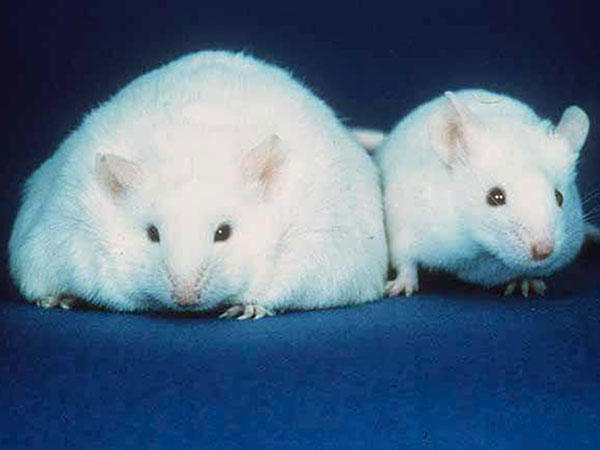Mouse Study Points to Mechanism Linking Obesity and Colorectal Cancer Risk
, by NCI Staff
Researchers have identified a biological mechanism that may help explain a longstanding association between obesity and an increased risk of colorectal cancer in humans. In mice, the researchers found, the excess intake of calories reduced the production of a hormone that activates a signaling pathway involved in suppressing the development of tumors in the colon and the rectum.
Expression of the hormone, guanylin, which is only produced and acts in the colon, is often reduced in obese individuals.
Based on their results, the researchers identified an existing drug, linaclotide (Linzess®), that is similar to guanylin, and the expression of which is reduced in obese individuals. The drug is now being evaluated in human studies for its potential to address the biological changes associated with obesity and increased colorectal cancer risk.
The study, led by Scott Waldman, M.D., Ph.D., of Thomas Jefferson University in Philadelphia, appeared in Cancer Research on January 15.
The risk of developing colorectal cancer is higher among obese individuals than among lean individuals. Although this association has been reported in many studies, the mechanism (or mechanisms) by which obesity may promote cancer is not known.
In this study, Dr. Waldman and his colleagues followed up on findings in previous studies that, in humans and animals, the loss of guanylin contributes to the development of colon cancer by silencing the expression of its receptor on the epithelial cells that line the intestine. This receptor, called guanylyl cyclase C (GUCY2C), acts as a tumor suppressor by regulating the frequent regeneration of the intestinal epithelium.
To investigate whether obesity is associated with this process, the investigators studied mice fed either a high-fat diet, which caused obesity, or a high-carbohydrate diet, which did not cause obesity. Regardless of which diet the mice were fed, the investigators found that guanylin expression was reduced and the intestinal epithelium showed changes characteristic of tumor development.
Moreover, a strain of mice that does not become obese in response to a high-fat diet also showed reduced guanylin expression and evidence of cancer-associated epithelial changes when fed this diet. Conversely, mice with a genetic propensity to gain weight without ingesting additional calories maintained normal levels of the hormone. Finally, in obese mice that had been fed a high-fat diet, guanylin levels returned to normal after 4 weeks on a calorie-restricted diet even though the mice did not experience any appreciable weight loss.
These observations suggest that “guanylin suppression…reflects the quantity of ingested calories, rather than the type of calories” or inflammatory or other metabolic changes often linked with obesity, the authors wrote. This finding was a surprise because it is through these metabolic changes that obesity is often thought to lead to cancer.
Further experiments suggested that excess calories may reduce guanylin expression by inducing a stress reaction in cells called the unfolded protein response. The unfolded protein response is normally activated when unfolded or misfolded proteins accumulate in the endoplasmic reticulum. This stress response has also been implicated in a number of diseases.
“This study identifies, quite convincingly, one of the possible mechanisms that links colorectal cancer and obesity,” commented Asad Umar, D.V.M., Ph.D., chief of the Gastrointestinal and Other Cancers Research Group of NCI’s Division of Cancer Prevention. “The researchers also identify a possible intervention that could remove the negative effects of a high-calorie diet.”
When the researchers used genetic tools to replace the missing hormone in the mice, they restored the tumor-suppressing activity and prevented cancer—even in animals that continued to consume excess calories. “This study demonstrates that if you can prevent hormone loss, you can also prevent tumor development,” Dr. Waldman said in a news release.
Linaclotide, a pill, is structurally similar to guanylin and binds to the GUCY2C receptor. The hope is that the drug, which has been approved to treat some patients with irritable bowel syndrome, could activate the tumor-suppressing receptor and help prevent cancerous changes from occurring in obese patients.
NCI is funding an early phase clinical trial that is evaluating whether treatment with linaclotide can induce changes in molecular pathways similar to those seen in this study.
“If a role in humans is confirmed, then that will provide a basis for colorectal cancer prevention studies in humans,” said Dr. Umar.
